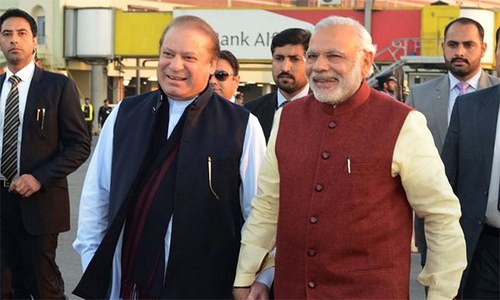At least seven Indian Air Force personnel have been killed as a siege of the Pathankot airbase in Indian Punjab continues for a third consecutive day. At least five attackers have also been neutralised so far.
Read editorial: Attack on Pathankot air force base.
Almost all major Indian newspapers, in editorials published after the Pathankot attacks, advised their government to "stay the course" and not stall or suspend talks with Pakistan after the attacks, which are seen as an attempt to undermine resumption of dialogue between the two neighbours.
Stopping talks is to play into hands of terrorists: Hindustan Times

"India’s policy must be guided by discerning the motivations of the masterminds.
"The attack was geared to drive a wedge between Mr Modi and his counterpart Nawaz Sharif, who are attempting to bridge strategic differences and explore regional cooperation.
"For that matter, the two attacks in Punjab at Pathankot and Gurdaspur (in July) appear expressly aimed at undermining the possibility of more economic exchange between the two provinces of Punjab in both the countries. Saturday’s attack could also be designed to sow fresh suspicion in Indian minds about the intent of Pakistan army chief General Raheel Sharif, as many will be quick to assign responsibility to Rawalpindi.
"The Pathankot attack is stuff of the challenge that non-State actors pose to policymakers. It is also meant to test the resolve of the Centre to see if outraged domestic opinion can unsettle its focus on broader policy goals. Resiling from engagement is just the kind of reaction that jihadis want. New Delhi must effectively use the NSA channel, which discusses terrorism, to unravel the conspiracy behind such attacks and convey to Islamabad that an attack on an air force base is a red line that warrants clear action against the perpetrating group. The Opposition, including the Congress, must back NDA’s approach of continuing dialogue while being firm on terror."
Dialogue with Pakistan must go on: The Indian Express

"First, Delhi must resist the temptation to call off the dialogue Prime Minister Modi initiated. Talking is not surrender.
"Even nation-states locked in combat, after all, use their diplomatic tool-kits. Delhi must, however, bring to the table a clear agenda for the actions it expects Pakistan to take on terrorism — and, critically, a roadmap for what it is willing to do in return for those demands being met, such as movement towards the demilitarisation of Siachen.
"Second, even as it talks, Delhi must consider what elements of national power it can marshal to deter Pakistan from continuing to sponsor jihadist groups. India has many excellent reasons to avoid crisis-inducing steps, like the use of military force, which would hurt its own economic objectives. However, there is a wide range of steps, including economic measures, which could bring pressure to bear on Pakistan."
Big test for Modi government’s new Pakistan policy: Times Of India
Terming the Pathankot attacks the 'first big challenge' to Modi's new peace initiative with Pakistan, Times of India said the Indian government must put pressure on Pakistan to show that it’s serious about preventing such attacks in the future at the foreign secretary level talks scheduled in Islamabad on January 14-15.
"This attack has been contained but it follows a fixed pattern: Every major peace move is preceded or quickly succeeded with a terror attack on Indian soil, designed specifically to put a spanner in the works. Because there has always been a powerful segment within the Pakistani ‘deep state’ that is hostile to the idea of peace with India." .
Stay the course after Pathankot: The Hindu
"Going forward, the talks process must be further insulated from the ‘veto’ of these forces.
"First, the foreign secretaries must move quickly to set up a timetable of meetings of all the secretaries in the two countries involved in the comprehensive dialogue.
"The process will receive momentum if India and Pakistan agree to a resolution on what are often called the “low-hanging fruit” of issues such as visas, confidence building measures on the Line of Control, water issues and the Sir Creek dispute. The more issues they are able to agree on, the greater their chances of addressing the single largest issue that holds back ties today, that of terrorism.
"On this, it is for Pakistan to show its good intentions, by acting against the JeM and LeT, both in court and on the ground in Punjab where they run extensive militias. India must stay the course it has set in the past month, including during the National Security Adviser talks, where it has delivered its message firmly, but quietly, with no hint of the one-upmanship that can hamper engagement. These actions will pave the road that was opened by the two Prime Ministers on Christmas day, allowing them to slice through the proverbial Gordian knot on India-Pakistan ties, rather than having to disentangle the ends that constantly threaten to strangle peace in the subcontinent."














































